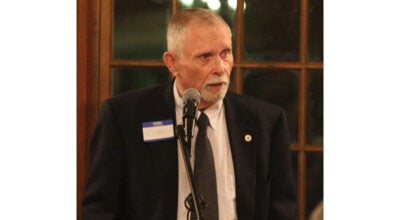Looking Back: Vaughan heads Virginia Roads Association
Published 6:55 pm Tuesday, February 4, 2020
|
Getting your Trinity Audio player ready...
|
By Clyde Parker
Feb. 5, 1920
Southampton County people are generally pleased at the election of General C.C. Vaughan of Franklin as president of the Virginia Good Roads Association. General Vaughan was chosen at the annual meeting of that body in Richmond last week to serve for the ensuing year. Few men in Virginia have taken such an interest in better highways as the association’s new president and none have worked more faithfully or effectively than he for the important cause of better roads in the Old Dominion.
As an example of his “better roads” advocacy, we cite the fact that General Vaughan, just a few years ago, was the architect and promoter of the highway, known as “The Ridge Route,” that connected Norfolk with Richmond by way of Portsmouth, Suffolk, Franklin, Courtland, Sebrell, Homeville and Petersburg.
Other officers elected were vice presidents: R.H. Angell, Roanoke; G.T. Adams, Old Point Comfort; and R.R. Turner, Fauquier. D.B. Ryland, of Lynchburg, was elected secretary and treasurer.
Back to Vaughan, when, back in 1917, as a Brigadier General, he was preparing to assume the position of Commander of the U. S. Army’s 29th Infantry Division, he was retired due to health reasons. Just prior to his retirement, though, he was promoted to the rank of Major General which allowed him to add another star to his uniform. Also, starting back in 1915 and continuing until 1917, as a Brigadier General, he had served as Commandant of the Virginia Army National Guard.
It was after his distinguished military career that General Vaughan, wanting to continue his involvement with good causes, took up the mission to bring about, establish, and maintain better highways throughout Virginia.
•••
Murfreesboro-Franklin railroad proposed
An initial meeting in connection with a proposed railroad from Murfreesboro, North Carolina to Franklin, Virginia — and to some point on the Atlantic Coast Line Railroad in Hertford or Bertie counties, in North Carolina, was attended by a large and representative body of our citizens here in Mayor Joe Bynum Gay’s office last Friday night. Also in attendance was a delegation from Murfreesboro — composed of J.A. Campbell, cashier of the First National Bank of Murfreesboro; Honorable Stanley Winborne; Honorable Lloyd J. Lawrence; J.D. Babb, Postmaster; and Messrs. Thomas B. Winn and M. E. Worrell.
A most interesting discussion took place in which General C.C. Vaughan of Franklin and the Murfreesboro delegation participated. In addition to the idea of a standard railroad, sentiment of some of the speakers was for the construction of a hydro-electric plant on the Meherrin River above Murfreesboro to produce power for an inter-urban trolley line to connect the towns within a 25-mile radius of the plant. Others still advocated a steam engine-powered regular railroad. The discussion, however, was of a most harmonious nature; and, on motion of General Vaughan, committees were appointed from Franklin and Murfreesboro to study the proposition with especial reference to the most practical and economic road to be built.
Mayor Joe Bynum Gay appointed on the committee from Franklin General C.C. Vaughan, R.A. Pretlow, R. C. Campbell, Major R.E.L. Watkins and Paul Scarborough.
Murfreesboro citizens serving on the committee are: J.A. Campbell, chairman, and Stanley Winborne, D.C. Barnes, Thomas B. Wynn, L.J. Lawrence and M.E. Worrell.
The many advantages to be gained by all sections affected by the new road were strongly stressed at Friday’s meeting and were generally agreed upon. Whether its route from Murfreesboro would lie by Como or by Sunbeam and Statesville to Franklin, and the selection of a southern terminus at Ahoskie or Aulander are matters to be decided upon as the plans take more definite shape; but, backers of the enterprise are fully determined to build the road and to begin actual construction at the earliest possible moment. The committees are accumulating a great deal of useful information and a most enthusiastic meeting is expected here on the night of the twentieth.
Murfreesboro, undoubtedly, needs a railroad and would naturally prosper by the building of the contemplated line, but it is none the less evident that such a railroad would benefit Franklin as much or more than any other point to be touched by it. In the first place, the territory which the road would pierce is as good a rural section as can be found in the South and has developed and progressed wonderfully even without those modern transportation facilities which are requisites for prosperity in this age. No doubt, the opening of this railroad through comparatively virgin territory would bring to it and to the logical terminus of the road, Franklin, an enormous volume of trade, both wholesale and retail.
A wonderful commercial advantage to the Town of Franklin and its industries would be realized.
The eastern section of North Carolina is a most valuable business feeder to the cities of Norfolk and Suffolk. With this railroad being built, commerce from our sister state would traverse through Southampton County; and, the people of Franklin can readily see how important it is to support this proposed new venture in every possible way.
It was through no fault of Franklin that the VIRGINIAN RAILROAD was built with the sole idea that its construction should take the shortest and straightest possible coal-carrying route between the coal fields of West Virginia and the sea at Norfolk.
But, now, in the present-day instance, to miss the opportunity of joining forces with the promoters of the aforementioned project would be calamitous in the extreme and highly detrimental to the future growth and progress of Franklin.





